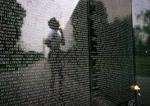
jordanmfriedman.wp.com
But she overcame her fear like the true warrior she sought to be, and approached the wall with a steadfast walk. And right away, among the crowd of strangers, she spotted the elderly couple from the train. They were standing still by one of the black panels, hugging each other, the head of the woman leaning on the shoulder of the man, his arm around her waist. United in grief.
A thought had crossed her mind in a flash: maybe, just maybe, they are his parents. Her grandparents. Why not? She would find out in a minute. So she hurried to join the few people waiting quietly in line beside a man, a Vietnam Vet, holding a thick book in his hands. She figured he could help her. And even though most of the people ahead of her, unlike her, were not by themselves, she didn’t feel lonely at all. Maybe because of the elderly couple, and maybe because of the folded piece of paper in her windbreaker’s pocket, which she now pulled out and unfolded. And read, not for the first time since she’d left her new home yesterday morning.
Read the name: Raymond De Rosi. And read the date of his death: February 11, 1969. And read the force: U.S. Marine Corps. It was written in her mother’s clear, round handwriting. The last thing Joy had asked her to do yesterday morning, before Ursula rushed out with Trent, taking him to school and then ahead for her first day back at work. She didn’t tell her mother why she needed her to write it down, despite her mother’s protests.
It was a secret, her own little secret, now within reach. Maybe that’s why she didn’t mind waiting in line, and didn’t mind the dark clouds, either. It seemed appropriate, the way the clouds encircled the black wall, making it less distinguishable, but at the same time, strangely enough, more prominent.
Even the white piece of paper in her hand was covered with a layer of gray, she noticed when she handed it over to the Vietnam Vet, who was wearing his army uniform, colorfully decorated with medals and stuff. He smiled at her, then flipped quickly through the pages of the thick book, full to capacity with names.
The process, she’d observed before, was rather fast and problems free. Not this time, though. The first sign that something might be wrong came when the Vietnam Vet halted his search and raised his eyes at her. Suspiciously, she thought. Or maybe it was all in her head, as right away he directed his eyes back to his book-of-names and continued his search.
Until he stopped altogether and handed her back the piece of paper. “Sorry, ma’am,” he said with a heavy Southern accent, “he’s not listed.”
“What d’you mean, not listed?” she almost shouted, refusing to take her note back.
“His name’s not on the wall,” he answered patiently.
Her heart skipped a beat. The color of her face, most probably, had changed dramatically. Because he looked at her more concerned now, when he asked: “Are you sure, ma’am, about the spelling of his name?”
She nodded.
“Do you know anything else about his tour of duty, by any chance?”
“He was a marine. That’s all I know.”
“Good enough,” he said unimpressed, and handed her back the piece of paper. “Go up to the information booth over there,” he pointed the way. “They might be able to help you better.”
* A short story excerpt from my novel: Very Narrow Bridge.
To be continued next month on the 15th.

